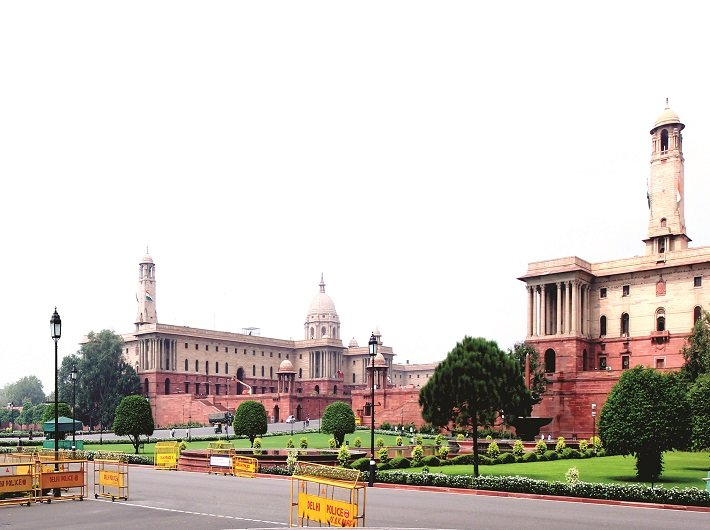Kejriwal wants full statehood for Delhi, with control over police and land. Why it is not likely to happen soon, and why he should nuance his demand
After the most stunning election victory in memory, Arvind Kejriwal may seem to be most powerful chief minister in the country. Actually, he has less power than all the rest of the CMs. That is because of the special status of the capital. Kejriwal does not have any say over three things that most CMs want to keep tabs on: public order, police and land – the three entries in the State list of the constitution that are currently denied to Delhi.
Kejriwal, after the results, met prime minister Narendra Modi and home minister Rajnath Singh, and sought full statehood for the capital – as pledged in the Aam Aadmi Party (AAP) manifesto. His demand is not likely to be granted soon. His predecessor, Sheila Dikshit, was unable to persuade the centre to make Delhi a full state even when the central government was led by her own party for the better part of her 15-year rule. Also, the partial statehood came via a law enacted by parliament, and any change in it also has to come from parliament, where a consensus on this issue will be elusive.
Yet, Kejriwal’s demand has revived the debate over the demand for more powers to the Delhi government – and over the best administrative setup to govern the capital: one of India’s smallest states but arguably the biggest city.
It was way back in 1987 that the question of how to best govern the capital was first taken up, leading to the formation of a committee. On the basis of its recommendations, the union territory of Delhi was converted into a state after the 69th amendment of the constitution in 1992. The new entity was named ‘national capital territory of Delhi’. It was to have a legislature and all due powers to make laws – but no say on public order, police and land, which were kept with the centre.
That seems to be the price Delhi has to pay for being the capital. One of the prime reasons for keeping police and public order under the centre’s control is that Delhi is home to the central government, top institutions of the state like the supreme court, embassies and numerous VVIPs.
Shakti Sinha, a veteran bureaucrat who served as finance and power secretary in the Sheila Dikshit government, feels it would be next to impossible for Delhi to achieve full statehood. “Whichever government runs Delhi, no central government would want to sit in a territory which is controlled by a state government,” says Sinha.
There is a history behind that mindset. In 1911, India’s capital under the British rule was shifted from Calcutta (now Kolkata) to Delhi. This step was taken primarily due to the uprising in Bengal against the British rule at that time, which made Calcutta inhospitable to continue as the capital. Citing this historic event, Dhirendra Singh, former union home secretary, says, “It is highly necessary and important to ensure that a country’s capital is not affected by local politics.”
Of course, Singh also believes, “Why should any union minister have a problem whether police is under the control of the centre or the state? If he (minister) is a law-abiding citizen, there is nothing for him to be afraid of or be wary of.”
During Kejriwal’s 49-day tenure in 2014, then Delhi law minister Somnath Bharti had a tussle with the police when he tried to order them and they refused to follow him. This defiance by the police seemed to have irked the AAP which was also under constant pressure by the public to redress grievances in matters related to the police. The AAP government found itself on no-man’s land as it could neither demand accountability from the police nor could it save the public from harassment. Given this dilemma for AAP, Singh feels that the larger question here is not really about shifting control but of good governance. “The Delhi government should get control on subjects of police and land but the intention should not be merely seeking more power to be able to do a wrong – like transferring a cop if he does not abide by the whims and fancies of the government,” says Singh.
The contention of AAP does hold some ground as the communication gap between the public and the local police is also because the centre does not oversee day-to-day functioning of the Delhi police. Sinha feels that this further leads to misunderstanding: if there is a law-and-order crisis, people will first blame the Delhi government – as it happened after the 2012 gangrape.
The Delhi government, however, would find many supporters on the issue of transfer of power on the subject of land. Currently, the Delhi development authority (DDA) reports to the union ministry of urban development, while the municipal corporations of Delhi and the New Delhi municipal council (NDMC) answer to the ministry of home affairs. “This is absurd. Add to it the overlap in the functions of the Delhi government and the municipal bodies, as both run educational and health institutes,” says Sinha.
In case Delhi attains full statehood, it would also take away some benefits currently enjoyed by Delhi. If the control over public order, police and land is transferred to Delhi, the state would no longer receive funds from the centre on these three entries. With AAP’s populist, pro-poor and anti-corporate approach, raising capital and resources would be a difficult task. “After privatisation of power distribution in 2003, Delhi started earning a lot of money. However, during the third term of Sheila Dikshit, expenditure stared growing tremendously – mainly for development purposes. As a result, savings started depleting so much that they went down from '7,713 crore (as on April 1, 2011) to '1,985 crore (April 1, 2013). The Delhi government might fall in trouble if more expenditure is laid on its shoulders,” adds Sinha.
On a more positive note, Delhi BJP spokesperson Sanjay Kaul feels that transfer of powers is no rocket science and can be achieved by Delhi without many obstacles. “It would be a flawed argument to say that the law-and-order situation or VIP security would become vulnerable if the power is shifted to the Delhi government from the centre. VIPs are also sitting in other states, where the subject of policing is overseen by the state government,” says Kaul.
Suggesting viable options for AAP now, Singh says legal and constitutional ways can be explored. “Amendments can be made in the constitution and powers be given to the Delhi government, with a coordination committee between the centre and the Delhi government.” Sinha feels that AAP would have to scale down its demand. “Ask for more control without mentioning statehood, else you would turn it into a political issue. Even the likes of Washington DC, Canberra and Brasila are also not full states, mostly because of the same reasons that have prevented Delhi from achieving statehood,” he says.
yogesh@governancenow.com
(The article appears in the March 16-31, 2015, issue)

